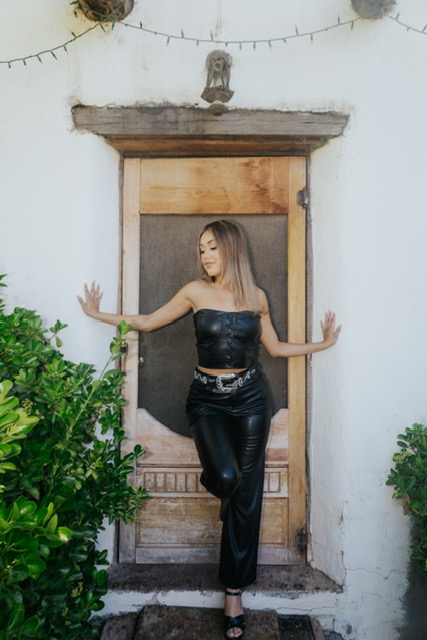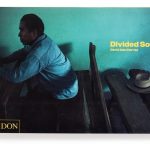
Story and Editorial photography by
Annabella Mireles
Additional photography provided by
Gisselle Lopez
When thinking of the term “mariachi,” many people may have the typical image in their head of a man or woman wearing traje de charro, which consists of ornamented jackets and pants or skirts along with a sombrero. Mariachi music is no stranger to the border community since its roots are embedded in Mexico, however, 23 year-old singer Gisselle Lopez has expanded what mariachi can look and sound like while also representing her culture on a larger scale.
Lopez, who also holds the title of Miss El Paso for 2024, grew up with a passion for singing mariachi, despite it being considered traditional Mexican music. Lopez gravitated toward the genre and was encouraged by family to sing at family gatherings.
“Every time my grandma would take me to birthday parties, I would always be on top of the tables singing and dancing at four years old,” she recalls. “My parents really supported my dreams. Once they saw that I had this artistic side to me, they would give me songs to sing.”
At 12 years old, Lopez decided to participate in a local singing competition while dressed in the traditional traje and joined other competitions shortly after getting a taste of the music world.
“I won second place for a local singing contest that was through Telemundo,” Lopez said. “After that competition, my mom signed me up on La Voz Kids without me knowing. My mom had gotten the email that I had been chosen to audition, but the closest city they recorded in was Houston. Around that time, my dad had lost his job. I remember they would constantly be selling stuff like my dad’s speakers, and my mom even put her wedding ring in a pawn shop.”
Lopez, not having any idea what her parents were saving money for, eventually found out she was accepted for an audition on the live show.
“I felt so bad because I knew we didn’t have the money,” Lopez said. “They were sacrificing so much so we could go on this trip that I wasn’t even guaranteed to get picked for. It was a 50/50 chance, so the whole ride back home after the audition, I felt so bad because I felt like I made my parents spend so much money. A month later, we got a call telling us I made it, and we flew to Orlando for the recording of the show.”
Not only was Lopez juggling being a singer, as well as a public figure by being on live television, she was also juggling high school and the stresses of being a teenager.
“It was hard because at that age, I was a freshman in high school,” Lopez said. “I would get bullied, especially because of what I sing. I’ve always sang mariachi and traditional songs, and nowadays, not a lot of people like that – especially my generation. They don’t really like it or have respect for it, but I fell in love with it at a super young age. I would wear my traje and people would tell me ‘Why are you wearing that?’, ‘You look like a boy’ or ‘You sing ugly.’”
In addition to facing bullying from her peers, Lopez also dealt with being away from her family for months at a time due to shooting schedules for the show.
“My family and I are very close,” Lopez said. “Being away from my three little sisters and my dad was hard. My mom had to leave them and come with me, and we were away for a total of three months. Even though that was hard, I gained so much from that experience. People are still curious about it and it’s just something that not a lot of people are blessed to experience. I lived a dream. I met so many people and it changed my life completely.”
After making it to the battle rounds on La Voz Kids and meeting celebrities such as Daddy Yankee and Pedro Fernández, Lopez returned home to both positive and negative comments.
“I was depressed about the loss. When I came back home, I saw comments on YouTube clips from the show where people were posting negative comments about my voice. I had a hard time with that, but I feel like since it happened at an early age, comments like that just don’t affect me anymore,” she said.
At 16, Lopez made the transition into working with a rock mariachi band named Tribes and has released several albums with them, and has also started working on other ways to embrace her heritage.
“My heritage is very dear to my heart,” she said. “My parents are immigrants, so I’m a first generation American. I saw the process of gaining citizenship because my mom didn’t become a citizen until I was 18. I always had the goal of becoming the first person in my family to graduate from college because my dad was the first to graduate from high school. When I first went to college, I thought I would never graduate since I didn’t have any guidance. I would literally sneak into the financial aid nights to try to learn how to do it myself,” she explained.
While going for her bachelor’s in early childhood development with a concentration in business marketing, Lopez decided to try out another venture: pageantry.
“I never knew how to walk in heels,” she said. “I wanted to learn how to talk and walk with confidence. Then, I won my first title last year, which was Mission Trail in Socorro. I was not expecting it. After that, I wanted to go for the El Paso title. So, I did it again and won my title in April. A lot of people have a misconception of pageant girls, like ‘They just won because they are pretty, skinny, or rich.’ All that has really nothing to do with it. People can forget what you look like, but they will never forget how you treat them or how you make them feel.”
Most recently, Lopez competed in the Miss Texas competition where she sang “No Me Queda Más” by Selena, once again expressing her love for singing and her culture.
“A lot of people were surprised when I sang in Spanish,” Lopez said. “Pageantry is kind of a white woman thing. There’s not a whole lot of Hispanics, but I got to use the space to talk about being an immigrant, and I’m grateful for the platform. At Miss Texas, they have these little girls who are the princesses there, and as cute as they were, I couldn’t help but notice there weren’t any little Hispanic girls there.”
With pageantry, Lopez continues to share her culture by singing in Spanish and advocates for the border city. She created her own clothing brand, “Desert Diva,” that she says is for the “modern, western and sexy diva” and wears her own designs on stage. Her stylistic and modern take on western clothing, as well as repping her brand while singing rock Mariachi has changed the game.
“I’ve always loved the tradition behind Mariachi,” Lopez said. I fell in love with the combination of trumpets and big powerhouse singers. I think it’s important to know your roots and know the significance of your culture.
Lopez is finishing the album with Tribes and will continue to work for the community by hosting fundraisers and has other plans in the works. It’s trailblazers like Lopez who remind us that although something is considered “traditional”, it doesn’t mean it can’t still be appreciated or given a new twist.















